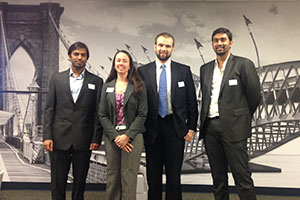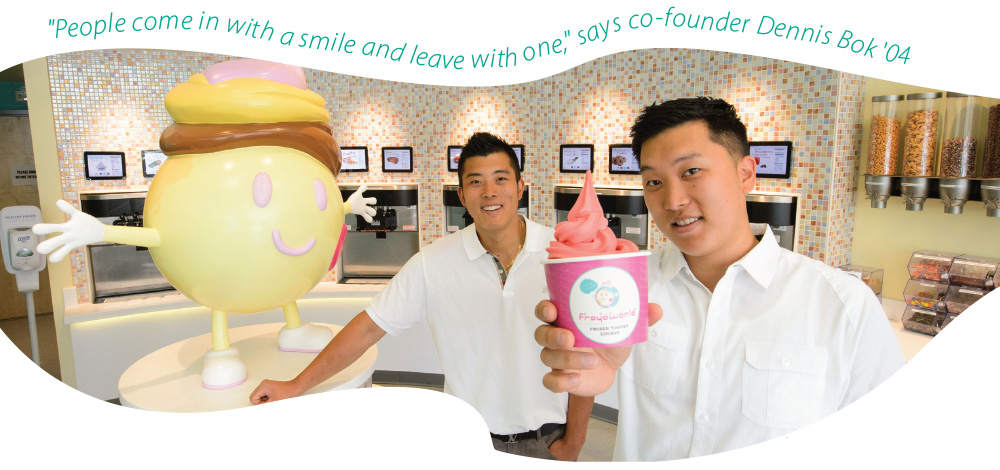MIT Sloan Management Review – Could your company use its legal environment to look for strategic opportunities? Consider bringing in a chief legal strategist, recommend Robert C. Bird, associate professor of business law and Northeast Utilities Chair in Business Ethics at the UConn School of Business and David Orozco, an associate professor of legal studies and MBA program director at the Florida State University College of Business.
News
All School of Business pressroom news
Priceline.com Partners With UConn School of Business’ MSBAPM Program for Data Challenge

Priceline.com leverages data to solve today’s most complex eCommerce problems. On November 12, the online travel company partnered with UConn’s MS in Business Analytics and Project Management (MSBAPM) program to kick off a data challenge. During the two-week challenge, 17 teams of students had the opportunity to analyze and build predictive models of a subset of hotel search and book data.
Out of the 50+ students who participated in the challenge, 11 students (three teams) were advanced to the final round. The finalists presented their findings to a panel of analysts, senior and executive management at Priceline.com including Michael Diliberto, CIO and Bryan Lewis, CFO.
“Priceline.com is proud to partner with UConn’s School of Business… to offer its students the opportunity to perform research and build predictive models on customer search behaviors,” said Diliberto. “UConn students were able to discern some very key patterns in large quantities of disconnected messages.”
Presentations were held at Priceline’s headquarters in Norwalk, Conn. on December 5, where the panel voted on the winning team based on both deliverable and presentation skills.
The winners of the challenge are: Jennifer Eigo, Chandra Karri, Dilip Sagar Manjunath, and Daniel Silvis. Each winning team member received a $300 Priceline.com gift card to use online, and all challenge participants received 15% off their next Priceline.com purchase.
These Women Mean Business
Nearly 400 participate in Connecticut’s women’s entrepreneurship conference seeking to gain business development, leadership expertise
This article first appeared in the UConn Business magazine, Volume 4, Issue 1 (Winter 2014)
When Jennifer Mastriano‘s in-laws founded MGM Carting and Recycling 20 years ago, friendly and reliable service was the bedrock of their North Haven business.
Today it still is. Continue Reading
Business Briefs (Winter 2014)
This article first appeared in the UConn Business magazine, Volume 4, Issue 1 (Winter 2014)
Faculty & Staff
Sulin Ba, professor of OPIM, was named associate dean of academic and research support.
Business Law faculty Gerlinde Berger-Walliser, Robert Bird, Vincent Carrafiello, Mark DeAngelis, Karla Fox (emeritus), Stephen Park and Mark Spurling participated in the 88th annual Academy of Legal Studies in Business (ALSB) conference, held in Boston, Massachusetts.Continue Reading
Message from the Dean (Winter 2014)
This article first appeared in the UConn Business magazine, Volume 4, Issue 1 (Winter 2014)
The entrepreneurial spirit has always been a part of the fabric of the State of Connecticut. We are, after all, home to the first hamburger, the original lobster roll, the Wiffle Ball and the Frisbee, the sewing machine and color TV. More recently, Connecticut innovators created the first nuclear submarine and the first artificial heart. Continue Reading
FroyoWorld is Sweet Success Story for Two Alumni

Storrs Center location. Photo courtesy of
Peter Morenus/UConn Photo.
This article first appeared in the UConn Business magazine, Volume 4, Issue 1 (Winter 2014)
If UConn alumni Dennis ’04 and William Bok ’08 (CLAS) had listened to popular opinion, they never would have launched their now wildly successful FroyoWorld franchise.
‘”There are other people who are smarter than you… why haven’t they started a self-serve frozen yogurt lounge?”‘ Dennis recalls someone saying. Others simply said, “Good luck,” with a sarcastic laugh.
“But three years later, after countless hours of hard work, we have more than 40 locations, and 30 more planned stores, including our first official international store opening in Australia,” Dennis Bok said. “Hopefully that puts the nay-sayers to rest!”
“When we started, we had a vision—and the vision was not opening a couple stores in and around Connecticut. We are FroyoWorld, with a little emphasis on the world,” he said with a chuckle. “Hopefully soon we’ll be an internationally-recognized brand. Time will tell.”
A first-generation American, whose parents moved to this country from Korea, Dennis said he always imagined himself as an entrepreneur. He was, in fact, so eager to prove himself that he didn’t want to go to college at all.
But his parents, who operated a dry-cleaning business in Branford and had an impeccable work ethic, were “sticklers for education.”
“After being ‘forced’ to go to college, I realized obtaining a higher education is the building block for one’s success,” he said. “With a strong base of knowledge from higher education institutions, such as UConn, mixed with some analytical reasoning abilities, your options are endless in this huge global market.”
William initially started a self-serve frozen yogurt lounge in San Francisco with his wife’s cousin. A few years later he sold the business and returned to Connecticut. By then both he and Dennis recognized the potential success of a frozen yogurt business on the East Coast and “jumped on it.”
The first FroyoWorld opened in New Haven in August 2010, with the brothers and William’s wife as partners. Today most of FroyoWorld’s stores are located in New York or New England, with another six in Puerto Rico and one in Australia. Each store employs about 15 people.
Perhaps Bok’s favorite store is the one located in Storrs Center, adjacent to UConn. FroyoWorld is one of 29 businesses in the center, which includes a mix of restaurants, shops, offices and homes.
“We believed in UConn and the Leyland Alliance’s vision of a downtown Storrs so much that we signed the lease and paid a deposit almost two years prior to opening our doors at Storrs Center in 2012,’’ Bok said. “It was a coming-home to UConn. To say the least, we loved the location.’’
And at that store, as with others, business is brisk.
“I think the popularity of our business is that it is a nice place to visit,” Dennis said. “People come in with a smile, and they leave with one. The yogurt is delicious and it is a healthy sweet alternative because of its probiotics.”
In the beginning, Bok admits, he ate three or four frozen yogurt treats a day, although lately he has scaled back some. “My preference is original tart flavor, with a little ‘cake batter’ added in,” he said. “And I like the fruit toppings.”
By adding new flavors and toppings, the franchise plans to grow and retain its customer base, he said.
Last summer FroyoWorld had a store opening almost every weekend. “It has been pretty hectic and I don’t see it slowing down soon,” he said. “We’ve added more staff, but we’re working 24/7. It comes with the territory.”
Despite starting the business during an economic downturn, Bok, had few reservations.
“I don’t make any decision based on emotions. I have to have the facts to back it up,” he said. “Everything in life can be a calculated risk. Being educated in accounting at the UConn School of Business has helped me tremendously. Numbers don’t lie.”
Working with his sibling has been “awesome,” said Dennis, the older of the two brothers. “We have many common goals. That’s not to say we haven’t had a few fights. We have. But we’ll always make up and shake hands.”
When asked if there are any celebrities or famous persons he would like to share a frozen yogurt with, Bok is quick to answer.
“I would love to sit down and have a cup of FroyoWorld with President Obama, and talk to him about anything other than politics. That would be nice,” he said.
“We have had a few Boston Celtics and New England Patriots players as patrons in our stores, as well as Miss USA 2012 [Olivia Culpo]. I hope one day Ray Allen casually strolls into a store while I’m there. He’s probably my favorite UConn alumnus of all time!”
Disabled R.I. Veteran Launches ‘Broken Gear’ Clothing Line
Providence Journal – “It was amazing,” says Steven D’Amico, referring to UConn’s Entrepreneurship Bootcamp for Veterans with Disabilities (EBV).
“You’re there for nine days, 18 hours a day, on your business. At the end of the time, you have to do a pitch.” D’Amico was one of 25 disabled veterans who attended the UConn EBV program (one of 8 nationwide) last October. He plans to use his business to help other injured veterans.
UConn Ranked #1
UConn was ranked #1 in the ranking of the Top 25 Online Masters in Accounting Degree Programs by Accounting Degree Review, an independent and objective resource for current and prospective accounting and finance students. See the full article and top 25 listing here.
Second Thursday…A D.I.Y. Support Group

This is a guest post by Arthur (Art) Schwartz ’54 (CLAS). Art is a retired UConn alumnus, class of ’54, who built a small, successful business producing trade shows, consumer events, as well as managing trade associations and publishing a regional trade magazine.
“As the owner of a small business, do you sometimes feel alone and isolated? I certainly did. With another small business owner and friend, we did something about it. ‘Second Thursday’ became the name of a group we formed to act as each other’s consultants and our board of directors.
We each agreed to recruit two or three other Small Business Entrepreneurs (SBE’s) and meet once a month for two hours over bagels and coffee. The initial purpose we proposed would be to discuss the common and unique problems each member encountered. Continue Reading
UConn Students Selected for PwC Explore Program
 PwC’s Explore program is an opportunity for students interested in considering a business or accounting-related major to learn about careers in business and accounting at PricewaterhouseCoopers.
PwC’s Explore program is an opportunity for students interested in considering a business or accounting-related major to learn about careers in business and accounting at PricewaterhouseCoopers.
Rachelle Joseph ’17 and William Moore ’18, have been selected to attend this one-day program comprised of interactive activities and training sessions aimed at developing teamwork, strategic thinking, creativity, problem-solving, and leadership skills. Students’ participation in the program will not only help cultivate these important characteristics, but also provide a great networking forum with other students and individuals from PwC.
The Explore program is an outstanding opportunity for talented freshmen and sophomores to learn more about the accounting profession and to discover their career goals and aspirations, all while having a lot of fun.
The program will be held on Saturday, January 24, 2015 at the PwC Boston offices. To learn more, please visit http://www.pwc.com/us/en/careers/campus/programs-events/explore.jhtml.